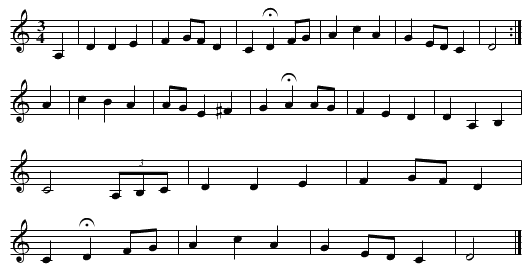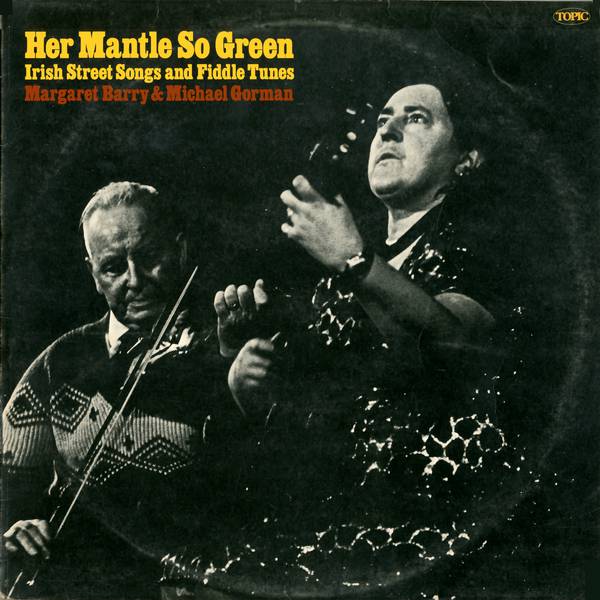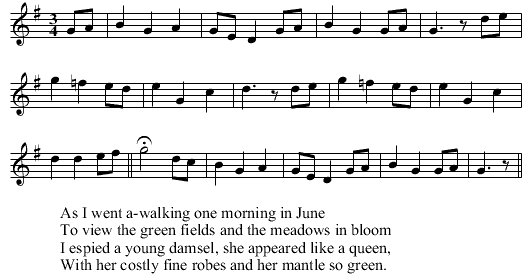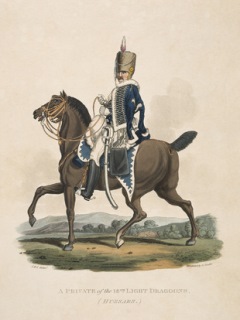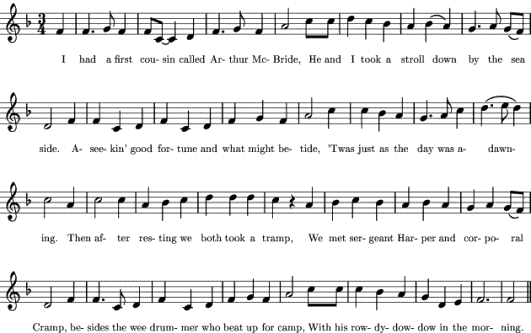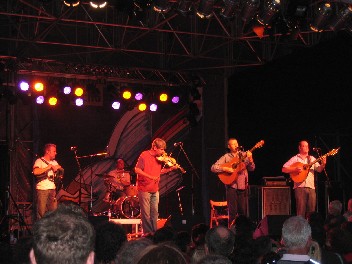FolkWorld #57 07/2015
The Battle of Waterloo
The related article has been withdrawn by the author.
Songs That Made History:
This year marks the 200th anniversary of the Battle of Waterloo, which as you all know occured
on the 18th of June in 1815. The 7th Coalition was triumphant and Napoleon and his forces
were defeated on the famous field which lies 15 km south of Brussels.
The Eighteenth of June / Poor Boney
Eighteenth of June
All you people who live at home easy
And are far from the trials of war
Never knowing the dangers of battle
But are safe with your families secure
Know you, the long scythe of destruction
Has been sweeping the nations all round
But it never yet cut with the keenness
That it did on the eighteenth of June
And what a sad heart had poor Boney
To take up instead of the crown
And to canter from Brussels to Paris
Lamenting the eighteenth of June
It began about five in the morning
And it lasted till seven at night
All the people stood round in amazement
They had never yet seen such a sight
And the thunder of five hundred cannon
Proclaimed that the battle was on
And the moon in the sky overshone all
Recording the eighteenth of June
All you young girls with sweethearts out yonder
That go daily to buy the black gown
It's one thousand to one I will lay you
Your love fell on the eighteenth of June
Sixty thousand stout-hearted brave soldiers
Who died made an awful pall tune
And there's many's the one will remember
With sorrow the eighteenth of June
 Listen to Eighteenth of June from:
Gráda
Listen to Eighteenth of June from:
Gráda
 Watch Eighteenth of June from:
Martin Carthy, Eric Starr
Watch Eighteenth of June from:
Martin Carthy, Eric Starr
[Roud 2539; trad.]
This ballad recalls Napoleon Bonaparte's defeat at the Battle of Waterloo
on June 18, 1815.
Henry Burstow of Horsham, Sussex, learnt it from Jim Shoubridge, Rifle
Brigade, who had fought at Waterloo.
Vaughan Williams collected the ballad from Burstow in 1905,
and it was published in the
Journal of the Folk-Song Society 2 (issue 8, 1906) p. 193.
Rod Stradling recorded The Eighteenth of June
at home in the early 2000s. This recording was included in 2005 on the
Musical Tradition anthology
Songs from the Golden Fleece.
He noted in the accompanying booklet:
This splendid song comes from Henry Burstow of Horsham, Sussex, from whom
Vaughan Williams collected it in 1905. It was published in the
Journal of the Folk-Song Society 2 (1906) p. 193.
In the midst of a conversation with Martin Carthy about English Napoleonic
songs, he produced it out of that prodigious memory of his … and
I immediately and unashamedly stole it! It subsequently turns out that it is
a song that Mike Waterson sings, and that he’d made a few alterations to it
along the way. And so have I—and have yet to see a copy of the original.
Being an Englishman, I frequently feel ashamed at what my warlike country has
done (is still doing!) to others around the world. So I’m delighted to find,
and proud to sing, a song about our ‘greatest military victory’ which is so concerned with the plight of the ordinary people involved on
both sides. It doesn’t even mention who won!
Frank Harte learned The Eighteenth of June from Rod Stradling
and sang it in 2001 on his CD of traditional songs on Napoleon Bonaparte,
My Name is Napoleon Bonaparte
(Musical Traditions review).
Norma Waterson sang this song as Poor Boney
on April 2, 2001 at Newcastle Live Theatre.
This recording was included in 2004 on the Watersons' 4 CD anthology
Mighty River of Song.
 Martin Carthy sang The Eighteenth of June
on February 2, 2006 as part of the
“Folk Britannia: Which Side Are You On?”
concert at the London Barbican. It was first broadcast in the UK on BBC4
on February 24, 2006
Martin Carthy sang The Eighteenth of June
on February 2, 2006 as part of the
“Folk Britannia: Which Side Are You On?”
concert at the London Barbican. It was first broadcast in the UK on BBC4
on February 24, 2006
 He also sang The Eighteenth of June in the
1983 BBC production of Keith Dewhurst's "Battle of Waterloo",
which was transmitted live from BBC Pebble Mill studios in Birmingham on
February 13, 1983.
He also sang The Eighteenth of June in the
1983 BBC production of Keith Dewhurst's "Battle of Waterloo",
which was transmitted live from BBC Pebble Mill studios in Birmingham on
February 13, 1983.
Mick Ryan and Pete Harris sang The Eighteenth of June
in 2004 on their WildGoose CD
Something to Show.
They commented in their liner notes:
The Eighteenth of June, a lament for the dead of the battle of
Waterloo, came from that great Irish singer, Frank Harte. It is, however,
an English song. Those who know the ‘original’ will notice some
changes in the words, together with a new verse.
Jim Moray sang The Eighteenth of June
in 2012 on his CD
Skulk.
He noted:
From Henry Burstow of Horsham (1826-1916) via Martin Carthy, although Martin
tells me that this version was refined and added to by Mike Waterson.
© mainlynorfolk.info/watersons/songs/theeighteenthofjune.html
Mantle of Green / Her Mantle So Green / Willy O' Reilly
Her Mantle So Green
As I went out walking one morning in June,
To view the fair fields and the valleys in bloom,
I spied a pretty fair maid she appeared like a queen
With her costly fine robes and her mantle so green.
Says I, "My pretty fair maid, won't you come with me
We'll both join in wedlock, and married we'll be,
I'll dress you in fine linnen, you'll appear like a queen,
With your costly fine robes and your mantle so green."
Says she now, "You Young man, you must be excused,
For I'll wed with no man, you must be refused;
To the green woods I will wander to shun all men's view,
For the lad that I love fell in famed Waterloo."
"O, then, if you won't marry, tell me your love's name,
For I being in battle, I might know the same."
"Draw near to my garment and there will be seen,
His name is embroidered on my mantle so green."
In raising her mantle there I did behold
His name and his surname in letters of gold;
Young William O'Reilly appeared in my view
He was my chief comrade back in famed Waterloo.
"But when he was dying I heard his last cry
'If you were here, Lovely Nancy, contented I'd die;'
Now Peace is proclaimed, and the truth I declare
Here is your love token, the gold ring I wear."
"O, Nancy, dear Nancy, 'tis I won your heart
In your father's garden that day we did part.
Now the wars are all over, no trouble is seen
And I'll wed with my true love in her mantle so green."
 Listen to Her Mantle So Green from:
Matt & Shannon Heaton, Sinéad O'Connor
Listen to Her Mantle So Green from:
Matt & Shannon Heaton, Sinéad O'Connor
 Watch Her Mantle So Green from:
Mothers of Intention, Sinead O'Connor
Watch Her Mantle So Green from:
Mothers of Intention, Sinead O'Connor
[Roud 714; Laws N38; G/D 5:1033; Henry H76; Ballad Index LN38; Bodleian Roud 714; Wiltshire 628, 885; trad.]
Jim O'Neill of Markethill, Co. Armagh, sang Her Mantle So Green
to Peter Kennedy and Sean O'Boyle at Markethill, Co. Armagh, on July 12, 1952.
This recording was included in 1975 on the Saydisc anthology
Traditional Songs of Ireland
and in 2012 on the Topic anthology of
ballads sung by British and Irish traditional singers,
Good People, Take Warning
(The Voice of the People Volume 23).
Margaret Barry sang Her Mantle So Green
on her 1957 Topic album
Street Songs and Fiddle Tunes.
This track was also included in 1965 as the title track of her Topic album
Her Mantle So Green.
Two versions, one of them with Michael Gorman on fiddle,
are on her 1998 Rounder anthology
I Sang Through the Fairs.
Robert Cinnamond of Belfast sang Willy O' Reilly
on the anthology
A Soldier's Life for Me
(The Folk Songs of Britain Volume 8; Caedmon 1961; Topic 1970).
This was also included with the title Young Willy Reilly
in 1985 on his posthumous Topic album
You Rambling Boys of Pleasure.
Proinsias Ó Conluain commented in the latter album's sleeve notes:
Not Willie Reilly and His Colleen Bawn [Roud 537]
but Willie Reilly, “my chief comrade in famed Waterloo”,
whose “Nancy, lovely Nancy”, had she been there, would have helped
him to die content. Belonging to the “broken token” category,
the song is usually known as The Mantle So Green
(see Ó Lochlainn, Irish Street Ballads, no. 7).
Richard Grainger sang Willy O'Reilly
in 1984 on his Fellside album
Herbs on the Heart.
Kevin Mitchell learned The Mantle So Green
“from the singing of Jim O'Neill, Tyrone”
and sang it on his 1996 Greentrax CD
I Sang That Sweet Refrain.
Sheila Stewart sang Mantle So Green
in 2000 on her Topic CD
From the Heart of the Tradition.
Maddy Prior sang Mantle of Green
on Steeleye Span's 2004 CD
They Called Her Babylon
and live at The Rose Theatre Tewkesbury on April 20, 2004, published
on both their video
The 35th Anniversary World Tour
and the CD
The Official Bootleg.
Ken Nicol commented in the first album's sleeve notes:
A “broken token ballad”. These are songs that typically contain
the theme of two lovers dividing a “token”, normally in the form of
a ring, then parting as he goes off to fight in some foreign land. When
eventually he returns, by sheer coincidence their paths cross again, but she
does not recognise him.
© mainlynorfolk.info/steeleye.span/songs/mantleofgreen.html
The Bonny Light Horseman / Broken-Hearted I Wander
The Bonny Light Horseman
Broken Hearted I Will wander (Roud 1185)
Ye maids, wives and widows, I pray give attention,
Unto these few lines, tho' dismal to mention
I'm a maiden distracted, in the desert I'll rove,
To the gods I'll complain for the loss of my love.
Broken hearted I'll wander,
Broken hearted I'll remain
Since my bonny light horseman
In the wars he was slain.
Well now Bonaparte he has commanded his troops for to stand
And he levelled up his cannon all over the land;
Yes he levelled his cannon, the whole victory to gain,
And he slew my light horseman returning from Spain.
Oh if I were a blackbird and had wings for to fly
I would fly to the spot where my true love does lie
It is with my little fluttering wings his wounds I would heal
And 'tis all for the night long on his breast I would lie.
Two years and two months since he left this bright shore,
My bonny light horseman that I did adore,
O why was I born this sad day to see,
When the drum beat to arms and did force him from me.
You should see my light horseman on a cold winter's day,
With his red and rosy cheeks and his curly black hair.
He's mounted on horseback, the whole victory to gain,
And he's over the battlefield for honour and fame.
Not a lord, duke or earl could my love exceed,
Not a more finer youth for his king e'er did bleed;
When mounted on a horse he so gay did appear,
And by all his regiment respected he were.
Oh Boney, oh Boney, I have done you no harm,
Tell me why then, tell me why do you cause me such alarm?
We were happy together, my true love and me,
But now you have stretched him in death o'er the sea.
Like the dove that does mourn when it loseth its mate,
Will I for my love 'til I die for his sake;
No man on this earth my affection shall gain,
And a maid live and die for my love that was slain.
 Listen to The Bonny Light Horseman from:
Margaret Bennett, Mark Evans, Craig Herbertson,
Lynch The Box, Socks in the Frying Pan, Dáithí Sproule,
The Voice Squad, Ewan Wilkinson
Listen to The Bonny Light Horseman from:
Margaret Bennett, Mark Evans, Craig Herbertson,
Lynch The Box, Socks in the Frying Pan, Dáithí Sproule,
The Voice Squad, Ewan Wilkinson
 Watch The Bonny Light Horseman from:
Maranna McCloskey, John Faulkner and Dolores Keane,
Socks in The Frying Pan, The Voice Squad
Watch The Bonny Light Horseman from:
Maranna McCloskey, John Faulkner and Dolores Keane,
Socks in The Frying Pan, The Voice Squad
[Roud 1185; G/D 8:1584; Henry H122a; Ballad Index HHH122a; VWML FK/16/125/1, FK/17/326/2; Bodleian Roud 1185; trad.]
The Bonny Light Horseman is a lament from the Napoleonic Wars.
Martin Howley sang The Young Horseman
to Jim Carroll and Pat Mackenzie in his home in Fanore, Co. Clare, in
summer 1975. This recording was included in 1998 on the Topic anthology
A Story I'm Just About to Tell
(The Voice of the People Series Volume 8).
Canny Fettle sang Bonny Light Horseman
in 1975 on their Traditional Sound album
Varry Canny.
This track was also included in 2002 on Fellside's anthology CD
Enlist for a Soldier.
Lal and Norma Waterson sang Bonny Light Horseman
on their 1977 album
A True Hearted Girl.
This recording was also included in the Watersons' 1992 CD re-release of
For Pence and Spicy Ale
and on the English folk anthology
And We'll All Have Tea.
Lesley Nelson comments:
Sam Henry noted the tune is probably over four hundred years old and is of
Irish origin because it used the old Irish gapped scale (which did not use the
fourth and seventh notes of the modern scale). According to William Barrett
the song appeared frequently in England after 1790 on broadsides printed
in London, Birmingham and Preston. There are several variants of the tune.
The song, also known as
Broken Hearted I Wander,
had widespread popularity during the Napoleonic Wars.
Pat Ryan sang Bonny Light Horseman
in 1977 on her Folk Heritage album
Leaboy's Lassie.
Mary Ann Carolan sang The Bonny Light Horseman
to Roly Brown at home in Hill o' Rath, Co. Louth
in 1978. It was released in 1982 on her Topic album
Songs from the Irish Tradition.
Sean Corcoran commented in the sleeve notes:
This English song was circulated on ballad sheets in Ireland and became
quite popular. Versions have been found in Wexford
(Stanford-Petrie No. 779), and the P.J. McCall Collection in the
National Library in Dublin, in Galway (sung by Sean O Conaire) and in Antrim
(Sam Henry,
Songs of the People,
No. 122).
It was sung to two distinct airs—a Southern and a Northern/Western.
Mrs Carolan sings the Southern air while the Galway tune is the same as
Henry's version A, although Sean O Conaire sings it in the highly
decorated sean-nós style of Connemara. When first recorded in 1970
Mrs. Carolan sang this song in a much faster tempo.
Jacquey Gabriel sang The Bonny Light Horseman
to Mike Yates in Winchombe, Gloucestershire in 1978.
This recording was included in 2004 on the Musical Traditions anthology
The Birds Upon the Tree.
Rod Stradling or Mike Yates commented in the accompanying booklet:
A song from the days of Waterloo. Numerous broadside printers issued it,
including Catnach, Such, Goode, Fortey and Batchelor (all of London),
Pearson and Swindells (both of Manchester), Fordyce (Newcastle-upon-Tyne),
Cooper (Newcastle, Staffs.), Harkness (Preston) and Pratt of Birmingham.
And at least two American printers issued it in their Forget-Me-Not Songsters.
(Locke & Bubier of Boston c. 1850 and Nafis & Cornish of New York
in 1835).
Some versions include verses relating to Napoleon Bonaparte—see, for
example, the version in Terry Moylan's
The Age of Revolution in the Irish Song Tradition 1776-1815
(Dublin, 2000, p. 139).
Planxty recorded Bonny Light Horseman in 1979 for their album
After the Break.
Lisa Null sang
Bonny Light Horseman
in 1980 on her and Bill Shute's LP
American Primitive.
Peter Bellamy and Claudia Schmidt sang chorus vocals.
Nic Jones sang
The Bonny Light Horseman
in 1980 at the Sidmouth International Festival. This recording was included
in 2004 on the 2 CD anthology
Folk Festival Sidmouth.
Another live recording from the 1970s but of unspecified origin was
included in 2006 on his Topic CD
Game Set Match.
Tony Rose learned the song
from Nic Jones when they were working together in Bandoggs.
He recorded it in 1982 for his album
Poor Fellows
and again in 1999 for
Bare Bones.
Simon Haworth and Tina Cooper sang The Bonny Light Horseman
in 1994 on their Fellside cassette
The First Shift.
Simon Haworth returned to this song in 1998 on his Fellside CD
Coast to Coast.
Eliza Carthy and Nancy Kerr also recorded this song—followed by
Michael Turner's Waltz—in 1995 for their CD
Shape of Scrape.
This track has been reissued on their compilation
On Reflection
and on the anthology
Troubadours of British Folk Vol. 3.
An alternate take of this recording can be found on the 1995 Mrs Casey Records
compilation
Evolving Tradition.
Eliza Carthy commented in original album's sleeve notes:
This is an Irish version of Bonny Light Horseman,
learned from Norma Waterson, and originally from Mary Ann Carolan.
And Nancy Kerr wrote:
Michael Turner's Waltz comes from the
Sussex Tune Book, and is about
Michael Turner,
clerk of the
parish and fiddle player.
In fact, Michael Turner's Waltz is the trio from Mozart's
Deutscher Tanz KV 536 no. 2, published in 1788.
See also the Mudcat Café thread
Origins: Michael Turner's Waltz.
Kate Rusby sang Broken-Hearted I Will Wander
on
Over the Hills and Far Away,
the 1996 soundtrack album of the TV drama series Sharpe.
Mick Ryan and Pete Harris sang The Bonny Light Horseman
on their 1996 compilation CD
The Widow's Promise.
Fi Fraser and Jo Freya sang Bonny Light Horseman
in 1998 on their No Masters CD
The Fraser Sisters.
They commented in their liner notes:
A song unashamedly stolen from the singing of Danny Stradling. As part of
our formative years were spent being encouraged, mentored, shepherded etc by
Danny and her husband Rod this song has fond memories. It is part of that
wonderful store of southern English folk songs that set sad stories to
relentlessly cheerful tunes.
James Keelaghan sang Bonny Light Horseman
in 2006 on his Fellside CD
A Few Simple Verses.
Rachel Newton sang Young Horseman
in 2008 on her and Lillias Kinsman-Blake's Fellside CD
Dear Someone.
The liner notes commented:
Rachel found this version of the popular folk song in the
Voice of the People
series. It was sung by Irish singer Martin Howley.
Joseph Topping sang Bonny Light Horseman
in 2010 on his Fellside CD
Ghosts in the Shadow.
Steve Roud included Bonny Light Horseman
in 2012 in
The New Penguin Book of English Folk Songs.
Bella Hardy sang it a year later on the accompanying Fellside CD
The Liberty to Choose: A Selection of Songs from The New Penguin Book of English Folk Songs.
© mainlynorfolk.info/watersons/songs/thebonnylighthorseman.html
Arthur McBride and the Sergeant / The Recruiting Sergeant
Arthur McBride and the Sergeant
Oh, me and my cousin, one Arthur McBride
As we went a-walking down by the seaside
Now, mark what followed and what did betide
For it being on Christmas morning…
Out for recreation, we went on a tramp
And we met Sergeant Napper and Corporal Vamp
And a little wee drummer, intending to camp
For the day being pleasant and charming.
“Good morning ! Good morning!” the sergeant did cry
“And the same to you gentlemen!” we did reply ,
Intending no harm but meant to pass by
For it being on Christmas morning.
But says he, “My fine fellows if you will enlist,
It’s ten guineas in gold I will slip in your fist
And a crown in the bargain for to kick up the dust
And drink the King’s health in the morning.
For a soldier he leads a very fine life
And he always is blessed with a charming young wife
And he pays all his debts without sorrow or strife
And always lives pleasant and charming…
And a soldier he always is decent and clean
In the finest of clothing he’s constantly seen
While other poor fellows go dirty and mean
And sup on thin gruel in the morning.“
“But“, says Arthur, “I wouldn’t be proud of your clothes
For you’ve only the lend of them as I suppose
And you dare not change them one night, for you know
If you do you’ll be flogged in the morning.
And although that we are single and free
we take great delight in our own company
And we have no desire strange faces to see
Although that your offers are charming
And we have no desire to take your advance
All hazards and dangers we barter on chance
For you would have no scruples for to send us to France
Where we would get shot without warning“
“Oh now!“, says the sergeant “I’ll have no such chat
And I neither will take it from spalpeen or brat
For if you insult me with one other word
I’ll cut off your heads in the morning“
And then Arthur and I we soon drew our hods
And we scarce gave them time for to draw their own blades
When a trusty shillelagh came over their heads
And bade them take that as fair warning
And their old rusty rapiers that hung by their side
We flung them as far as we could in the tide
“Now take them out, Divils!“, cried Arthur McBride
“And temper their edge in the morning“.
And the little wee drummer we flattened his pow
And we made a football of his rowdeydowdow
Threw it in the tide for to rock and to row
And bade it a tedious returning
And we having no money, paid them off in cracks
And we paid no respect to their two bloody backs
For we lathered them there like a pair of wet sacks
And left them for dead in the morning.
And so to conclude and to finish disputes
We obligingly asked if they wanted recruits
For we were the lads who would give them hard clouts
And bid them look sharp in the morning.
Oh me and my cousin, one Arthur McBride
As we went a walkin’ down by the seaside,
Now mark what followed and what did betide
For it being on Christmas morning.
 Listen to Arthur McBride from:
Martin Carthy, Lehto & Wright, Planxty,
Skyhook, Ralf Weihrauch
Listen to Arthur McBride from:
Martin Carthy, Lehto & Wright, Planxty,
Skyhook, Ralf Weihrauch
 Watch Arthur McBride from:
Tiernan McBride's film of Paul Brady's 'Arthur McBride,
Paul Brady, Planxty, Andy Irvine, Bruce Guthro,
Martin Carthy & Dave Swarbrick, Skyhook
Watch Arthur McBride from:
Tiernan McBride's film of Paul Brady's 'Arthur McBride,
Paul Brady, Planxty, Andy Irvine, Bruce Guthro,
Martin Carthy & Dave Swarbrick, Skyhook
[Roud 2355; G/D 1:78; Ballad Index PBB093; Bodleian Roud 2355; trad.]
Martin Carthy sang Arthur McBride and the Sergeant
on his 1969 album with Dave Swarbrick,
Prince Heathen;
this was reissued in 2001 on the compilation
The Carthy Chronicles.
Martin Carthy and Dave Swarbrick also played this
in 1976 as an instrumental on Dave Swarbrick's first solo album,
Swarbrick,
and played the song in 1992 on their video
100 Not Out.
A live recording from Cedar Cultural Center, Minneapolis, USA,
from the early 1990s was included on their 2011 CD
Walnut Creek.
Martin Carthy wrote in the original album's sleeve notes:
I have always assumed that this highly subversive song was from East Anglia,
but in fact I don't know. It is probably 18th century in origin and
I learned it from Redd Sullivan, who sang it with great wavings of the
arms—the folk world's Joe Cocker? The tune at the end is French.
A 1970 recording of
Arthur McBride
by Redd Sullivan can be found on the album of songs from the
BBC radio series
Folk on Friday.
The Exiles sang Arthur McBride
in 1966 on their Topic album
Freedom, Come All Ye.
Planxty sang Arthur McBride
in 1973 on their first album
Planxty.
They noted:
Arthur McBride is an anti-recruiting song from Donegal. This
version was collected by P.W. Joyce in his native Co. Limerick in the
early 19th century and printed by him in his collection.
Dick Gaughan sang Arthur McBride
in 1976 on the fundraiser album for the Folk Review magazine,
The Second Folk Review Record.
Danny Spooner, accompanied by Mick Farrell, sang Arthur McBride
in 1978 on their album
Limbo.
He noted:
Everyone admires the pacifist, especially when he proves his pacifism by
beating his antagonist into the ground. There are a couple of versions of
this one, and it has been recorded a number of times. It is on this record
because after a fine night at the Dan O'Connell folk club an Irish lad said
he'd buy a record if we recorded it. Quick as a flash, [Mick] Farrell
agreed.
Tony Rose sang The Recruiting Sergeant
on his 1982 album
Poor Fellows.
He noted:
The recruiting sergeant of the 18th and 19th centuries enjoyed a popularity
roughly akin to that of an eelworm in a potato patch. To ensnare the unwary
recruit he had to be capable of both silver tongued guile and ruthless
skulduggery… only the desperate volunteered! But not everyone was taken
in…! There's splendid irony in this most violent of anti-militaristic
songs. This version is to be found in Roy Palmer's
The Rambling Soldier
and I'm indebted to the Somerset group White Cockade for bringing it to my
notice.
John Kirkpatrick and Sue Harris sang Arthur McBride
on their 1989 Topic album
Stolen Ground.
This track was also included in 1994 on his Topic anthology
A Short History of John Kirkpatrick
where he noted:
During the 1960s the British magazine Folk Scene asked many leading singers
to submit their favourite song. This was A.L. Lloyd's choice.
Chris Foster sang Arthur McBride
in 2003 on his Tradition Bearers album
Traces.
Mike Bosworth sang Arthur McBride
in 2004 on his album of songs from the Sabine Baring-Gould Collection,
By Chance It Was.
This version I learnt from the singing of Bert Lloyd.
Sam Fone of Mary Tavy [in Devon] sang a very similar version titled
Arthur Le Bride
[which was collected in 1892 and can be found in
Sabine Baring-Gould's
Songs of the West].
Ewan McLennan sang Arthur McBride
in 2010 on his Fellside album
Rags & Robes.
He noted:
The compelling story of this song seems to recur again and again in the
traditional repertoires of man of the English-speaking countries—it was
clearly an issue that was commonly experienced over the centuries.
This particular version is from Ireland.
© mainlynorfolk.info/martin.carthy/songs/arthurmcbride.html
|
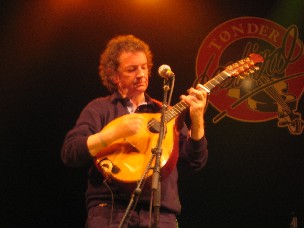
 Andy Irvine @ FolkWorld:
FW#5
Andy Irvine @ FolkWorld:
FW#5,
#11,
#23,
#27,
#30,
#35,
#36,
#44,
#48,
#53,
#55,
#55
www.andyirvine.com |
|
Battle of Waterloo
Spring comes to Kirrie, all the world¹s in bloom,
Winter is forgiven now, fooled by April¹s broom,
Kirrie, oh Kirrie, you were aye my hame
Till Napoleon¹s bloody cannon hit their aim,
Jeanie oh Jeanie, I am surely done,
Stricken down in battle, at the mooth o Boney¹s guns,
Jeannie oh Jeannie, aye sae dear tae me,
Let me hold you in my mind afore I dee
For the cold returns in autumn
when the wind rakes the trees,
And the summer lies forgotten
In a cold bed of leaves,
As winter begins aye mind Boney,
It wasn¹t only you,
Who was broken on the field of Waterloo.
Surgeon oh surgeon, leave me wi my pain,
Save your knife for others, who will surely rise again,
Surgeon oh surgeon, leave my blood to pour,
Let it drain into the bitter clay once more,
Daughter oh daughter, listen dear tae me,
Never wed a sodger, or a widow you will be
Daughter oh daughter, curse your lad to die,
Ere he catches the recruiting sergeant¹s eye,
Boney oh Boney, war was aye your game,
Bloody field your table, cannon yours to aim,
Boney oh Boney, we aye lived the same,
Drilling laddies not to fear the muskets¹ flame,
 Listen to Battle of Waterloo from:
Jim Malcolm, Old Blind Dogs
Listen to Battle of Waterloo from:
Jim Malcolm, Old Blind Dogs
 Watch Battle of Waterloo from:
Jesse Ferguson
Watch Battle of Waterloo from:
Jesse Ferguson
Postscript: Battle of Waterloo
Tune traditional; words and arrangement Jim Malcolm.
This song, based on a traditional tune of the same name, tells the story of a man from Kirriemuir who is dying on the battlefield of Waterloo. In his final moments he thinks of the family he has left behind in Angus, rails against the dangers of soldiering, and tells Napoleon: “It wasn’t only you who was broken on the fields of Waterloo”.
Photo Credits:
(1)+(4) Frank Harte,
(2) "The Green Mossy Banks of the Lea",
(3)+(5) Margaret Barry,
(6) "Her Mantle So Green",
(7) William Holmes Sullivan "Battle of Waterloo, 18th June 1815" 1898,
(8) A Private of the 18th Light Dragoons (Hussars) 1812,
(9) "The Bonny Light Horseman"
(10) Elizabeth Southerden Thompson (Lady Butler) "Listed for the Connaught Rangers - Recruiting in Ireland 1878",
(12) Paul Brady,
(13) "Arthur McBride and the Sergeant",
(15) Jim Malcolm
(unknown/website);
(11) Andy Irvine,
(14) Old Blind Dogs
(by Walkin' Tom).
FolkWorld - Home of European Music
 Layout & Idea of FolkWorld © The Mollis - Editors of FolkWorld
Layout & Idea of FolkWorld © The Mollis - Editors of FolkWorldListen to Eighteenth of June from: Gráda
Watch Eighteenth of June from: Martin Carthy, Eric Starr
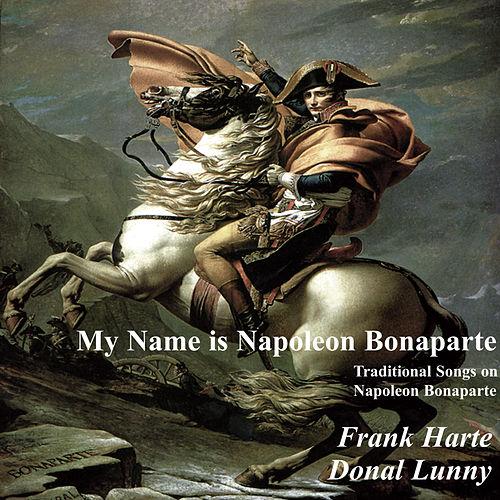
![]() Martin Carthy sang The Eighteenth of June
on February 2, 2006 as part of the
“Folk Britannia: Which Side Are You On?”
concert at the London Barbican. It was first broadcast in the UK on BBC4
on February 24, 2006
Martin Carthy sang The Eighteenth of June
on February 2, 2006 as part of the
“Folk Britannia: Which Side Are You On?”
concert at the London Barbican. It was first broadcast in the UK on BBC4
on February 24, 2006![]() He also sang The Eighteenth of June in the
1983 BBC production of Keith Dewhurst's "Battle of Waterloo",
which was transmitted live from BBC Pebble Mill studios in Birmingham on
February 13, 1983.
He also sang The Eighteenth of June in the
1983 BBC production of Keith Dewhurst's "Battle of Waterloo",
which was transmitted live from BBC Pebble Mill studios in Birmingham on
February 13, 1983.